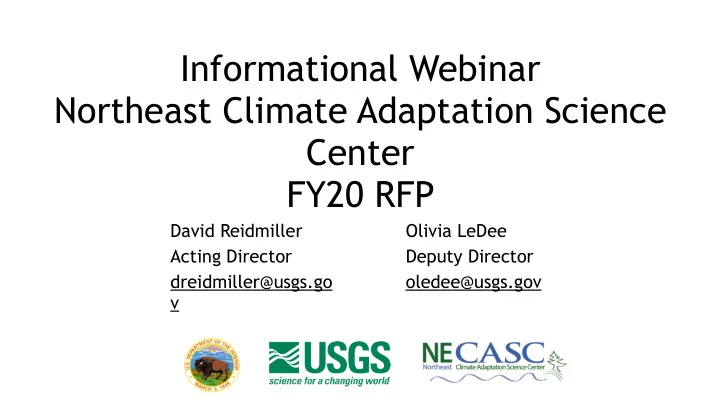

Informational Webinar Northeast Climate Adaptation Science Center FY20 RFP David Reidmiller Olivia LeDee Acting Director Deputy Director dreidmiller@usgs.go oledee@usgs.gov v
Program Mission Delivering science to help fish, wildlife, water, land, and people adapt to a changing climate Credit: Nieles
Goals • Respond to high priority management challenges • Foster substantive, sustained engagement between scientists and managers • Advance the understanding of the impacts of climate change on fish, wildlife, water, and land • Science to support sound resource management and adaptation
https://necsc.umass.edu/about- us NE CASC Northeastern region Anticipated FY20 research funding for the Northeast CASC region: $800,000-1,000,000 • Projects must be based within the Northeast U.S. (not yet defined) • Projects longer than 1 year are strongly encouraged to include interim deliverables • Projects should not exceed 3 years in duration • Total funding for individual projects should not exceed approx. $390,000 (over 3 years)
https://necsc.umass.edu/about- us NE CASC Midwestern region Anticipated FY20 research funding for the Midwestern region: up to $3,000,000 • Projects must be based in the Midwestern U.S. (not yet defined) • Projects longer than 1 year are strongly encouraged to include interim deliverables • Projects should not exceed 2 years in duration • Total funding for individual projects should not exceed approx. $600,000 (over 2 years)
Eligibility • Principal Investigators from either a CASC University Consortium member institution or U.S. Geological Survey may submit a Statement of Interest • Parties from other organizations (Federal, State, Tribal, or other) can participate (and receive funds via sub-award from the Principal Investigator)
Consortium Institutions
FY20 Solicitation Timeline Date (those after Jan 31 are subject to slide) Item December 13, 2019 Call for Statements of Interest January 31, 2020 Statements of Interest Due by 5pm CST via email** February 17, 2020 Full Proposals Solicited April 24, 2020 Full Proposals Due May 29, 2020 Selection Decisions and Applicant Notifications ** SOIs due by 5pm CST to Olivia LeDee (oledee@usgs.gov) and Michelle Staudinger (mstaudinger@usgs.gov) Please note if SOI is responsive to Northeast or Midwest region in the subject line Estimate project start: • USGS: after review, approval, and processing (ideally within 2-4 weeks of receipt of final proposal, budget, and DMP) • University: after review, approval, and processing (estimated in late 2020/ early 2021)
Expanding Climate Science for Fish and Wildlife Management Regional syntheses, quantitative evaluations/modeling, management assessments, or increase the application and dissemination of recent research in support of fish and wildlife management needs. • Direct and indirect responses and thresholds by fish and wildlife to climate impacts; • Adaptive capacity of fish and wildlife and/or habitat conditions that increase the likelihood of species persistence; • Management assessments that compare the risks, costs, and efficacy of potential and/or implemented climate adaptation actions; • Increasing the application and dissemination of recent research that expands on previous NE CASC projects and/or integrates results from multiple sources in adaptation planning and implementation; Special consideration for focal species including SGCN, listed species or those under consideration for the Federal Endangered Species Act; fish, wildlife, habitat resources of economic and/or cultural importance
Science to Steward the Great Lakes and Atlantic Coasts in an Era of Climate Change Conduct quantitative evaluations/modeling or management assessments to integrate climate and adaptation science in coastal zone management. • Direct and indirect impacts of coastal storms, altered ice cover, changes in Great Lakes water levels, SLR, inundation of natural and cultural coastal resources; • Evaluations of potential management strategies, actions, interventions; risk and cost-benefit assessments for increasing resilience and likelihood of persistence of coastal natural and cultural resources under future projections of landscape and climate change. Special consideration will be given to projects focused on • Evaluating the effects on sediment, nutrient and contaminant dynamics in the GLs coastal zone • Thresholds for management intervention; advance resilience strategies through green infrastructure, hybrid, other adaptation approaches • Conducted on federal, state, or Tribal lands.
Coupling of Freshwater and Terrestrial Systems Under Climate Change The interactive and/or synergistic effects of climate and non-climate stressors, as well as cascading impacts, on linked terrestrial-aquatic systems by: • Conducting quantitative analyses of climate-driven changes in terrestrial systems, including forest communities, and the subsequent changes in streams or lakes; • Advancing application and dissemination of recent research findings, especially related to extreme precipitation, aquatic connectivity, and thermal refugia; • Evaluating the implications, risks, costs, and efficacy of planned and/or implemented adaptation actions. Special consideration will be given to projects that emphasize integrated land and water management in response to climate change.
Climate Science on the Changing Invasive Plant, Pest, and Pathogen Landscape Impacts of and solutions to emergent or anticipated (non-native) invasive species or native species with climate-driven transformational roles in forests, grasslands, or wetland systems by: • Assessing climate induced shifts in the range, distribution, abundance, and/or functional role of an invasive plant, pest, or pathogen; • Evaluating the effectiveness of planned and/or implemented management actions to address climate-driven biological invasions or transformations.
Full Proposal Evaluation Criteria 1) Scientific merit and quality of the proposed research (30%) 2) Relevance and applicability to resource management needs (30%) 3) Engagement of and coordination with stakeholders, decision-makers, and science beneficiaries (20%) 4) Study team qualifications (10%) 5) Budget and work plan (10%) Additional Considerations and Information: • Data management plan • Potential for building on or extending CASC work throughout the region
http://necsc.umass.edu/ David Reidmiller Olivia LeDee Michelle Staudinger Acting Director Deputy Director Science Coordinator dreidmiller@usgs.go oledee@usgs.gov mstaudinger@usgs.go v v
Recommend
More recommend